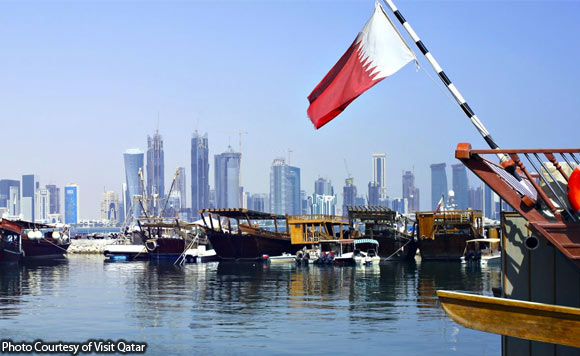AFP |
It has been more than a year since Saudi Arabia, the United Arab Emirates and its allies cut ties with Qatar, sparking the biggest diplomatic crisis to hit the Gulf in years.
A month later, Bahrain, Egypt and the UAE request that the ICJ resolve a dispute with Doha over sovereign airspace.
Here is a recap:
Regional rupture
Simmering regional tensions boil over on June 5, 2017, when Saudi Arabia and its allies Bahrain, Egypt and the United Arab Emirates (UAE) announce almost simultaneously that they are severing diplomatic ties with Qatar.
Read more: Qatar is still supporting terror in the Middle East: UAE tells…
They accuse Doha of supporting “terrorists” and being too close to Saudi Arabia’s Shiite archrival Iran — charges Qatar denies. Land and maritime borders with the Gulf peninsula are shut, air links suspended and Qatari citizens expelled.
Riyadh says it acted to “protect its national security from the dangers of terrorism and extremism”. In a country dependent on food imports, there is alarm over whether the border closures will lead to food shortages in Qatar. Saudi Arabia also closes the Riyadh bureau of Qatari broadcaster Al-Jazeera.
Demands, blacklist
On June 22, the Saudi-led bloc sends Qatar a list of 13 demands, which include shutting down its Al-Jazeera media network, curbing relations with Iran and closing a Turkish military base it hosts.
They give Qatar 10 days to comply. After a two-day extension, Qatar on July 4 rejects the list saying it is “unrealistic and is not actionable”.
Trump also praises Qatar’s purchases of military equipment from the US, which has about 10,000 troops at an airbase outside Doha — its largest in the Middle East.
Saudi Arabia and its allies threaten new sanctions. On July 25, they unveil a “terrorist” blacklist of 18 groups and individuals suspected of links to Islamist extremists and to Qatar.
The blacklist later grows to include almost 90 names. On September 9, Saudi Arabia, after an initial attempt by Qatar to hold talks with the Saudi crown prince, suspends any dialogue with Qatar.
Read more: A year of blockade: Qatar stands firm
Breaking isolation
Seeking support from outside the region and vowing to uphold its sovereignty, Qatar signs a series of defense deals with foreign powers. In June, Doha inks a $12-billion (10.4-billion euro) accord to buy US-made F-15 fighter jets.
In December, it finalizes contracts with France worth more than $13 billion and also concludes an $8-billion deal with Britain to buy Typhoon fighters. In January 2018, it approves legislation allowing 100-percent foreign ownership in most sectors of its economy.
Previously reliant on its Gulf neighbors, it increasingly turns towards Iran and Turkey, particularly for food imports.
Tensions in the sky
In January, Qatar says fighter jets from the UAE, one of the boycotting countries, violated its airspace in December and January. The UAE later accuses Qatari fighter jets of “intercepting” two Emirati passenger planes en route to Bahrain, drawing a swift denial from Doha.
In a country dependent on food imports, there is alarm over whether the border closures will lead to food shortages in Qatar. Saudi Arabia also closes the Riyadh bureau of Qatari broadcaster Al-Jazeera.
Both sides complain to the UN.
White House welcome
In April, US President Donald Trump receives the emir of Qatar, Sheikh Tamim bin Hamad Al-Thani, calling him “a friend of mine” and a “gentleman”, softening his tone after having initially backed the Saudi-led bloc.
Read more: King Salman seeks support from Macron to intervene in Qatar’s procurement…
Trump also praises Qatar’s purchases of military equipment from the US, which has about 10,000 troops at an airbase outside Doha — its largest in the Middle East.
International justice
In June, Qatar files a case at the UN’s top court, the International Court of Justice (ICJ), accusing the UAE of fostering an “environment of hate” against Qataris. A month later, Bahrain, Egypt and the UAE request that the ICJ resolve a dispute with Doha over sovereign airspace.
On July 23, the ICJ orders the UAE to protect the rights of Qatari citizens by allowing families with Qatari members to be reunited and Qatari students to complete their studies in the Emirates.
© Agence France-Presse














